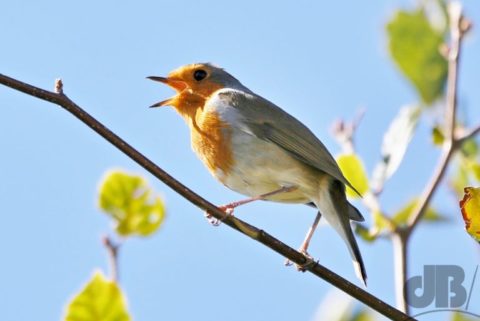It occurs to me occasionally and I forget to mention it, that this is probably the species of bird we Brits probably picture when we hear the song Rockin’ Robin.
I suspect, however, that the guy who wrote the song, Leon René (aka Jimmie Thomas), was actually thinking of the American Robin (Turdus migratorius), which is like a British Blackbird (T. merulea) or a Song Thrush (T. philomela) but with a red/orange breast.
Anyway, the American Robin’s song is much closer to the refrain “Tweet, tweedle-lee-dee” in the hit, than the rambling and melodic song of the European Robin. One more thing, check out the cover artwork of the record by original Rockin’ Robin artist, Bobby Day, he’s got macaws, parrots, but no sign of a Robin, American, European or otherwise as far as I can see.
Now, here’s a thing…mammals have a single set of vocal folds in the larynx of their trachea. That means they can only really ever bark, moo, yelp, or sing with one voice using that set of vocal folds. The “voicebox” of birds is further down their pipes at the place where the trachea branches into two bronchi. Birds have a syrinx* rather than a larynx, which allows them to create two tones at once.
The European Robin (Erithacus rubecula) is an old world flycatcher. Like I say, not to be confused with the American Robin demonstrating what is possible with a syrinx. Listen out for his neighbours calling at the points in the video when he stops singing. It’s impossible to know who sang first, maybe he’s replying, or maybe it’s them calling back to him.

For Rush fans, yes, that is the reference! The Temples of Syrinx from the 2112 opus. In classical Greek mythology, Syrinx was a nymph and a follower of Artemis, the goddess of the hunt.
Syrinx was known for her chastity, making her the perfect object of worship for the Priests of the Temples of Syrinx who by the year 2112 have banned pleasure (specifically music played on guitars) from the world in deference to computers. In Greek mythology Syrinx was pursued by Pan, the god of the wild and music.
To evade his advances, she fled into the river Ladon, where she asked the gods to turn her into reeds. Pan, of course, took those reeds and from them fashioned his panpipes, ultimately possessing Syrinx for his own pleasure. This myth is why the word syrinx is used for the double vocal flute of birds.